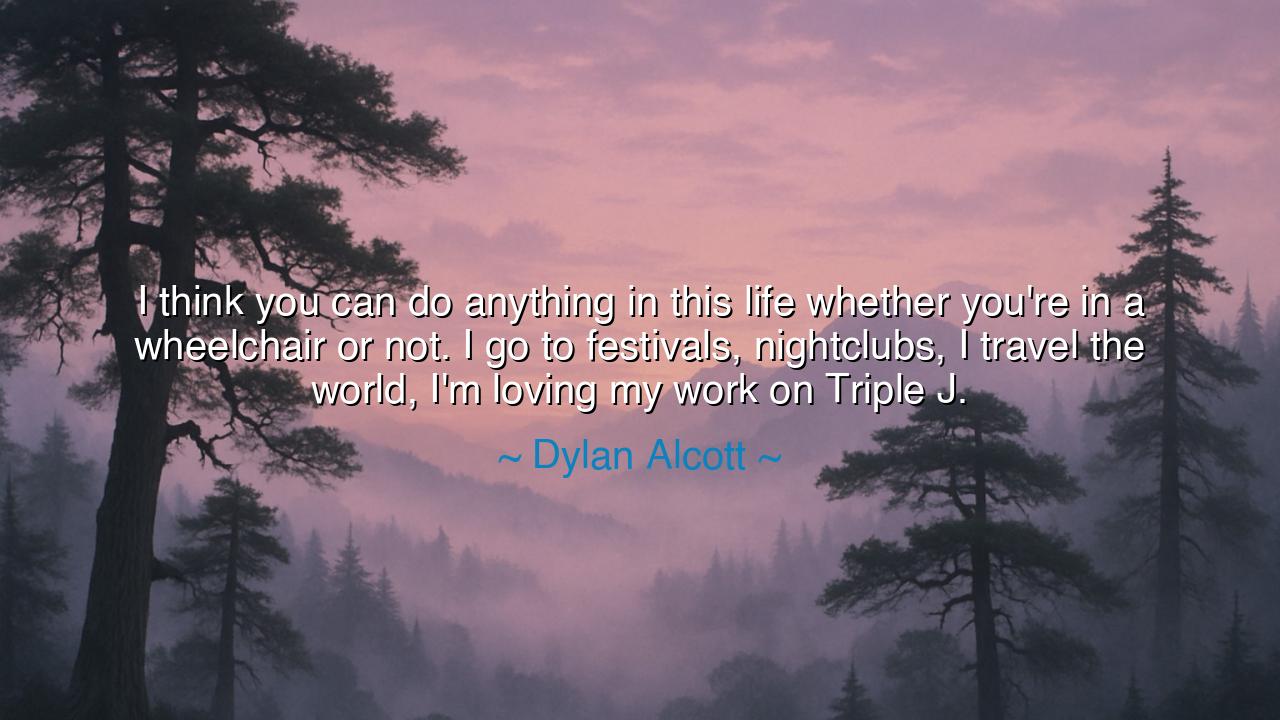
I think you can do anything in this life whether you're in a
I think you can do anything in this life whether you're in a wheelchair or not. I go to festivals, nightclubs, I travel the world, I'm loving my work on Triple J.






Hear now the words of Dylan Alcott, champion of spirit and master of courage: “I think you can do anything in this life whether you're in a wheelchair or not. I go to festivals, nightclubs, I travel the world, I'm loving my work on Triple J.” These are not the words of complaint, nor of one bowed by fate, but of one who looks upon limitation and declares it powerless. His voice is like a trumpet, sounding across the ages: no boundary of the body can bind the soul, no earthly chain can restrain the will that dares to live fully.
The wheelchair in his saying is not merely a chair upon wheels, but the symbol of all burdens mankind must bear. Some bear illness, some poverty, some sorrow or exile, and others carry scars unseen. Yet Alcott teaches that none of these should define the breadth of a life. For though flesh may falter, the spirit is vast, and though roads may seem barred, new paths appear when walked with courage. The man who dances in nightclubs though seated, who travels the world though constrained, shows us that joy is not the gift of circumstance but the fruit of defiance.
Think of Epictetus, the philosopher of old, who was born into slavery and whose body was twisted by lameness. Yet he became a master of wisdom, teaching emperors and shaping the thoughts of generations. When asked how he endured such hardship, he said: “You may chain my leg, but not my will.” Dylan Alcott, like Epictetus, echoes this eternal truth: no outward chain can imprison the inner freedom of man.
Mark also the story of Helen Keller, blind and deaf, yet who spoke to nations and inspired millions. She too lived as Alcott proclaims: that the world, with all its festivals, travels, and labors, belongs not to the perfect in form, but to the daring in spirit. Where others saw barriers, she found gateways. Where others pitied her, she rose as a teacher of courage. This lineage of defiant souls joins hands across time, proving that joy, work, and love are open to those who refuse despair.
The meaning of Alcott’s proclamation is therefore heroic: that life’s fullness belongs to the bold, not the unbroken. To travel, to laugh, to labor, to love—these are not denied by the body, but only by the surrender of the will. The festivals and the nightclubs he names are symbols of life’s celebration, of music and community. By partaking in them, he declares that the one in the wheelchair is not outside life’s circle, but at its very heart.
So let the hearer understand: you too carry a burden. Yours may not be visible, but it weighs upon you. Will you allow it to master you, or will you master it? The teaching of Dylan Alcott is not only for those in chairs, but for all who feel chained by fear, by doubt, or by circumstance. Rise, he says, and live as though no chain exists. The world belongs to the daring, not to the timid.
The lesson is this: do not wait for perfection before you begin to live. Begin now. Go where joy calls you, even if the way seems narrow. Work at what you love, even if others doubt you. Celebrate life in your own way, whether standing or seated, whether whole or broken. Build each day as proof that the spirit is greater than the body, and that courage is greater than fate.
Therefore, children of tomorrow, walk—or roll, or stumble—upon the road of life without fear. For in the end, it is not the wheelchair that defines the man, but the flame in his heart, the joy in his voice, and the courage with which he meets the world. This is the teaching of Dylan Alcott, and this is the inheritance of all who dare to live.






AAdministratorAdministrator
Welcome, honored guests. Please leave a comment, we will respond soon